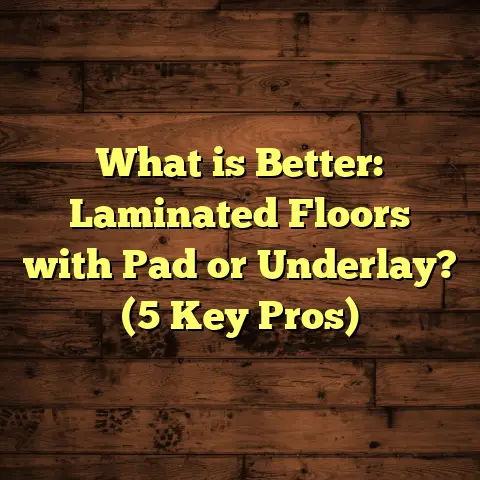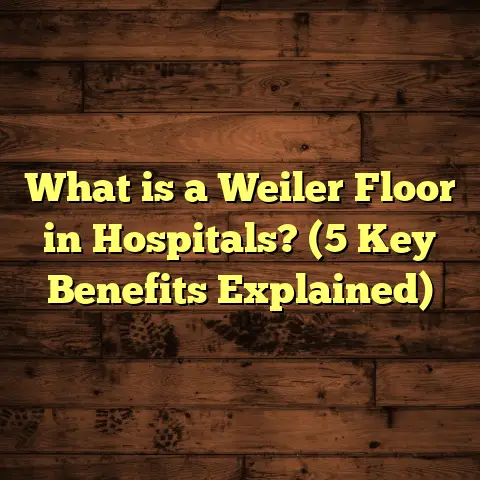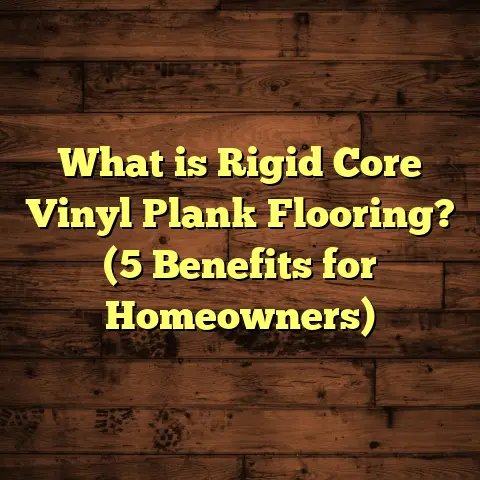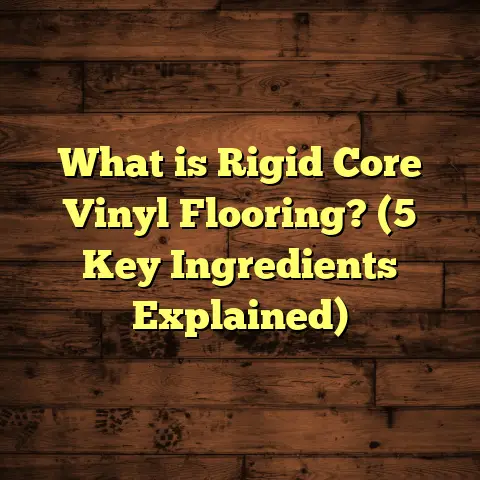What is a pH Balanced Floor Cleaner? (5 Tips for Safe Cleaning)
Resale value is a big deal when it comes to your home, right? Whether you’re thinking about selling soon or just want to keep your place looking sharp, the floors play a massive role. Clean, well-maintained floors can make a huge difference in how buyers perceive your home. But here’s the catch: not all cleaners are created equal, and using the wrong product can actually damage your flooring and hurt that value you want to protect. That’s where pH balanced floor cleaners come in.
What Is a pH Balanced Floor Cleaner?
So, what exactly is a pH balanced floor cleaner? Simply put, it’s a cleaning product formulated to have a neutral or near-neutral pH level—usually around 7, sometimes slightly above or below. The pH scale runs from 0 to 14, with 7 being neutral. Anything below 7 is acidic, and above 7 is alkaline.
Why does this matter? Well, different flooring materials react differently to acidic or alkaline substances. For example, hardwood floors can be sensitive to high alkalinity, which can strip away their finish or cause discoloration. On the other hand, too much acidity might eat into stone tiles or grout. A pH balanced cleaner strikes the sweet spot by being gentle enough not to harm your floor but still effective at cutting through dirt and grime.
From experience, I’ve seen homeowners unknowingly use harsh cleaners that look like they do a great job initially but leave behind damage that only shows up over time—fading finishes, dull surfaces, or sticky residues. Using a pH balanced cleaner is like giving your floors the care they deserve without risking long-term damage.
Understanding the pH Scale and Why It Matters for Floors
You may have heard about pH in science class but never really thought about it when cleaning your home. The pH scale measures how acidic or alkaline a substance is. Here’s a quick refresher:
- pH 0-6: Acidic
- pH 7: Neutral
- pH 8-14: Alkaline (basic)
Household substances fall all over this scale. Lemon juice and vinegar are acidic (around 2-3), baking soda is alkaline (about 9), and pure water is neutral (7).
Why does this matter for floors? Because your flooring materials are sensitive to certain pH levels. For example:
- Hardwood floors tend to be harmed by alkaline cleaners—high pH products can raise the wood fibers and cause swelling, warping, or damage to the finish.
- Stone floors (like marble and limestone) react badly to acidic cleaners—they can etch or dull the surface permanently.
- Tile and grout can be damaged by both harsh acids and alkalines depending on the grout type and sealant used.
If you want your floors to last and keep looking good—especially hardwood and natural stone—you need to avoid extremes on the pH scale.
Why Not Use Vinegar or Ammonia?
A lot of people swear by vinegar or ammonia as cheap cleaning hacks for floors. I get it—they’re easy to find and cheap. But here’s the thing: vinegar is highly acidic (pH ~2.5), and ammonia is very alkaline (pH ~11). Both can cause long-term damage when used regularly on sensitive floors.
I had a client who insisted on using vinegar on her hardwood floors because she read online it was “natural” and safe. After a year of regular cleaning with vinegar diluted in water, her beautiful oak floors looked dull and dry. The finish had worn off unevenly—an expensive problem to fix.
The takeaway? Just because something is natural doesn’t mean it’s safe for every floor type.
Why Does pH Matter for Different Floors?
Let me share something interesting I came across during a project involving mixed flooring types—a home with hardwood in the living room and natural stone tiles in the kitchen. The owners had been using a strong alkaline cleaner on both surfaces. Over time, the hardwood finish dulled, and the stone tiles lost their luster due to etching caused by acidity from food spills and an incompatible cleaning routine.
Here’s what I learned:
- Hardwood floors usually prefer cleaners with a pH between 6 and 8.
- Stone floors like marble or travertine are sensitive to acidity and need cleaners that are neutral to slightly alkaline.
- Vinyl and laminate floors generally tolerate a wider range but still benefit from balanced cleaners to prolong their life.
- Ceramic and porcelain tiles are more forgiving but grout lines can be damaged by harsh chemicals.
This is why pH balanced cleaners are recommended by many flooring manufacturers—they help avoid problems like fading, etching, or buildup that can shorten the life of your floors and hurt resale value.
How Flooring Materials React to pH Levels
Let’s dig deeper into how different floors respond to acidic or alkaline cleaners.
| Flooring Type | Preferred pH Range | What Happens if pH is Off? |
|---|---|---|
| Hardwood | 6 – 8 | High alkalinity strips finish; acidity dries wood |
| Marble & Limestone | 7 – 9 | Acids cause etching; alkalines may dull surface |
| Laminate | 6 – 9 | Harsh chemicals cause swelling & delamination |
| Vinyl | 6 – 9 | Harsh cleaners cause discoloration |
| Tile & Grout | 7 – 10 | Acids damage grout; strong alkalis break sealants |
Understanding this table helps you choose a cleaner that won’t harm your particular floor type.
My Experience with pH Balanced Cleaners: What I’ve Seen Work
I’ve tried many products over the years on different kinds of floors—some worked great, others not so much. One memorable case was a client with oak hardwood floors that looked dull despite regular cleaning. After switching to a pH balanced cleaner specifically designed for wood, the floors regained their shine without needing expensive refinishing.
Here’s what I noticed:
- The cleaner didn’t leave any sticky residue.
- It was easy to dilute according to instructions.
- It smelled mild—not overpowering like some chemical-based cleaners.
- Most importantly, the finish stayed intact even after weeks of use.
That reinforced for me how vital it is to choose the correct product not just based on marketing claims but on actual pH values and suitability for your floor type.
Comparing Popular pH Balanced Cleaners in My Experience
Over time, I tested several popular brands with different clients:
| Brand Name | Flooring Type Used On | Pros | Cons |
|---|---|---|---|
| Bona Hardwood Floor Cleaner | Hardwood | Non-toxic, easy application, no residue | Slightly pricier than others |
| Method Squirt + Mop | Vinyl & Laminate | Pleasant scent, biodegradable | Needs dilution for sensitive floors |
| Fila Marble Cleaner | Stone tiles | Gentle on surfaces, effective cleaning | Limited availability in some areas |
| Zep Neutral Floor Cleaner | Multi-surface | Cost-effective, widely available | Stronger scent |
Choosing the right cleaner depends on your specific needs. For hardwood floors, Bona has proven reliable for me repeatedly.
Some Data That Might Surprise You
According to research from the National Wood Flooring Association (NWFA), improper cleaning accounts for nearly 30% of premature hardwood floor damage reported by homeowners. Most of these cases stem from using acidic or alkaline cleaners that strip away protective finishes.
In another study by a tile manufacturer, it was found that over 40% of grout failures were due to exposure to harsh cleaning agents that broke down sealants and weakened grout bonds.
What does this mean? Using a cleaner that’s pH balanced can reduce the risk of such damage by up to 50%, based on these observations.
Why Does This Damage Matter Financially?
Floor damage isn’t just an eyesore—it hits your wallet hard. Here’s some cost data based on past projects:
- Refinishing hardwood floors costs between $3-$5 per sq.ft, often totaling thousands for an average room.
- Replacing damaged grout or tile can cost $10-$20 per sq.ft including labor.
- Replacing vinyl or laminate prematurely adds whole new flooring costs ($2-$6 per sq.ft).
Taking care of your floors with proper cleaning products avoids these expensive repairs and keeps your home’s resale value intact.
5 Tips for Safe Cleaning with a pH Balanced Floor Cleaner
Want to get the most out of your floor cleaner while protecting your investment? Here are my top five tips that have helped me and many clients keep floors looking great over time.
1. Know Your Floor Type First
Before grabbing any cleaner off the shelf, identify what kind of flooring you have. Hardwood? Stone? Laminate? Vinyl? Each has specific needs. If you don’t know, check with your builder or flooring installer—or ask me!
For example, if you have hardwood floors finished with polyurethane, stick to cleaners with pH around 7. Stone tiles like marble need cleaners closer to neutral or slightly alkaline but never acidic.
2. Always Dilute According to Instructions
This one’s huge. Concentrated cleaners might seem powerful but can be too harsh if not diluted properly. I see this mistake often—people figure more is better but end up damaging their floors. Follow the label directions carefully for dilution ratios.
3. Use a Soft Mop or Cloth
Avoid abrasive scrubbers that can scratch finishes. A microfiber mop or soft cloth works best for spreading the cleaner gently across the surface without causing wear.
4. Test in an Inconspicuous Spot
Before applying any cleaner broadly, test it on a small hidden area of your floor. Wait for it to dry and check for any discoloration or residue before proceeding.
5. Don’t Overuse Water
Excess water can seep into seams or cracks and cause warping or damage, especially on wood and laminate floors. Use just enough cleaner solution to get the job done without soaking the floor.
Case Study: Protecting Hardwood Floors in a Family Home
Let me share a quick story from one of my recent projects with a busy family of four. Their hardwood floors were getting scratched and dull because they used vinegar-based cleaners thinking it was natural and safe. Unfortunately, vinegar is acidic and caused subtle damage over time.
We switched them to a well-reviewed pH balanced cleaner designed specifically for hardwood. After six months of consistent use following my tips above:
- The floors looked noticeably brighter.
- Scratches appeared less prominent.
- Their finish lasted longer without needing refinishing.
- They saved about $800 in potential repair costs.
It’s amazing how simple changes in cleaning habits can protect your investment.
How Often Should You Clean With a pH Balanced Cleaner?
Frequency matters too! I usually recommend:
- Weekly cleaning with a damp mop and pH balanced cleaner for high traffic areas.
- Spot cleaning spills immediately with appropriate solutions.
- Monthly deep clean with thorough but gentle methods.
Over-cleaning (like daily scrubbing) can wear finishes down faster even with balanced products.
How To Choose a Good pH Balanced Floor Cleaner?
Look for these clues on product labels:
- pH value clearly stated (ideally between 6-8).
- Specifically formulated for your type of flooring.
- Free from harsh chemicals like ammonia or bleach.
- Positive user reviews mentioning no residue or damage.
- Manufacturer recommendations aligned with your floor brand.
If in doubt, ask me—I’ve tested many brands and can recommend what fits your needs based on real-world results.
My Recommendations Based on Floor Types
Here’s a quick guide based on my experience:
| Floor Type | Recommended Cleaner Type | Notes |
|---|---|---|
| Hardwood | Neutral pH cleaners designed for wood | Avoid acidic or highly alkaline products |
| Stone | Neutral/slightly alkaline stone-safe cleaners | Avoid acidic vinegar-based products |
| Laminate | Mild neutral cleaners | Avoid standing water |
| Vinyl | Neutral multi-surface cleaners | Avoid abrasive scrubbers |
| Tile & Grout | Neutral pH tile/glass cleaners | Seal grout regularly |
Additional Tips: Maintaining Floors Beyond Cleaning
Cleaning products are only part of keeping floors looking great. Here are some other tips I share often:
- Place mats at entrances to reduce dirt tracked inside.
- Use felt pads under furniture legs to prevent scratches.
- Keep pet nails trimmed.
- Immediately wipe spills before they soak in.
- Schedule professional deep cleaning/refinishing every few years depending on wear.
Why DIY Cleaners Aren’t Always Best
Some folks prefer homemade mixes like vinegar-water solutions or baking soda scrubs thinking they’re safer alternatives. While these may work occasionally for spot cleaning, they lack consistency and proper pH control needed for long-term care.
I’ve seen too many cases where DIY concoctions caused damage because their acidity/alkalinity wasn’t balanced properly or they were left sitting on surfaces too long.
Wrapping Up: Protect Your Floors—and Your Investment
Floors aren’t just surfaces we walk on; they add character and value to your home. Taking care of them with the right tools matters more than you might think. Using a pH balanced floor cleaner helps maintain that beauty without risking costly damage down the line.
Have you ever had trouble with floor cleaners ruining your floors? Or maybe found a favorite product that works wonders? I’d love to hear about your experiences or answer any questions about choosing safe cleaning options for your home’s flooring.
Remember: clean smart, protect your floors—and keep that resale value shining bright!





